The respected members of the oncology community who are listed below passed away in 2020–2021. The ASCO Post remembers them, their lives, and their contributions to cancer research and treatment.
John Bartlett, MD
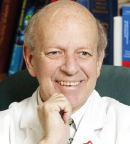
John Bartlett, MD
Dr. Bartlett, a visionary physician-scientist and pioneer in human immunodeficiency virus (HIV)/AIDS study and treatment who built the infectious diseases division at The Johns Hopkins Hospital, died on January 19, 2021, in New York. He was 83.
A 1959 graduate of Dartmouth College, Dr. Barlett received his medical degree at the State University of New York (SUNY) College of Medicine (now known as SUNY Upstate Medical University College of Medicine) in Syracuse in 1963. He did postdoctoral training at the Harvard University–affiliated Peter Bent Brigham Hospital in Boston and the University of Alabama in Birmingham, where he studied cardiac surgery.
During the Vietnam War, Dr. Bartlett was assigned from 1965 to 1967 to the Third Field Hospital in Saigon as a Captain in the Army Medical Corps. It was there that his interests turned to infectious diseases. After his military service, he worked at a Los Angeles veterans hospital and then joined the University of California in Los Angeles (UCLA) faculty. He moved to Tufts University’s New England Medical Center in 1975, and, in 1980, he was recruited to Johns Hopkins to become Chief of its then-small Infectious Diseases Division.
In the 26 years that Dr. Bartlett led the Johns Hopkins University School of Medicine’s Division of Infectious Diseases—from 1980 to 2006—it grew from just three full-time staff members and a budget of $200,000 to one of the institution’s largest divisions, with a roster of 55 faculty members, a staff of 177, and a research budget of $40 million. By the time he stepped down, the division was treating more than 5,100 patients annually with the latest in medication protocols, many of which he helped validate through clinical trials. Dr. Bartlett retired from Johns Hopkins in 2014. Three years later, the Johns Hopkins Hospital opened the John G. Bartlett Specialty Practice, a multimillion-dollar outpatient facility for patients with HIV, hepatitis, and other infectious diseases.
Dr. Bartlett’s Medical Management of HIV Infection, first published in 1994 and now in its 17th edition, and A Pocket Guide to Adult HIV/AIDS Treatment (now called the Bartlett Pocket Guide to HIV/AIDS Treatment), written in the early 1990s and currently in its 19th edition, remain the definitive textbooks on HIV clinical care.
“As a physician, teacher, and friend, John Bartlett touched the lives of many with his compassion and expertise,” his children, Valerie Clark and Josh and Scott Bartlett, said in a statement. “As a father, he taught us what it means to live a life full of love, happiness, and purpose. The outpouring of support and kind words for our father reminds us why he dedicated his life to medicine. We are thankful in the knowledge that he will always be an inspiration to us and to so many others.”
This in memoriam originally appeared on hopkinsmedicine.org. Photo courtesy of Johns Hopkins Medicine.
José Baselga, MD, PhD, FASCO
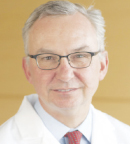
José Baselga, MD, PhD, FASCO
Dr. Baselga, a global innovator in novel cancer therapeutics, led research efforts in his native country of Spain and in the United States, most notably as Physician-in-Chief at Memorial Sloan Kettering Cancer Center (MSK). He died on March 21, 2021, at the age of 61.
A Barcelona native, Dr. Baselga became interested in oncology during his internal medicine training at Vall d’Hebron University, seeing it as a discipline that offered challenges and opportunity at once. After a 3-month elective rotation at MSK, he was granted a 3-year medical oncology fellowship at the institution, followed by a faculty post. By then, Dr. Baselga was married with two children and had planned to stay at MSK, where he was leading the clinical development of epidermal growth factor receptor and HER2 antibodies. However, he received an offer to head the development of a new oncology center in Barcelona.
“It was a tough decision to leave MSK, but I returned to Spain to build an oncology effort [for] Vall d’Hebron,” he noted. “It was there that I did some of my best translational work, leading multiple clinical trials in an environment where barriers to accrual and execution were less onerous.”
In 2019, Dr. Basegla joined AstraZeneca as Executive Vice President for Oncology Research and Development. Over the arc of his career, he was a key player in the development of trastuzumab, pertuzumab, lapatinib, alpelisib, and everolimus in the treatment of patients with breast cancer.
Dr. Baselga is survived by his wife, Silvia, and four children, Marc, Clara, Alex, and Pepe. His family established a GoFundMe page to raise money for research into Creutzfeldt-Jakob disease. Just 1 day into the fundraiser, close to $170,000 had been raised.
Gert Brieger, MD, MPH, PhD
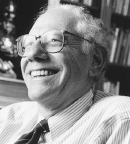
Gert Brieger, MD, MPH, PhD
Dr. Brieger, former Director of the Johns Hopkins University School of Medicine Institute of the History of Medicine, died on January 13, 2021, due to heart failure. He was 89. Dr. Brieger is credited with transforming the department from a research center with occasional students to a rigorous and successful academic graduate program that advanced the history of medicine field.
Born in Hamburg, Germany, Dr. Brieger and his family came to the United States in November 1938, fleeing Nazi Germany on the last passenger steamer from Hamburg Harbor—the day before Kristallnacht. He grew up in San Francisco.
Dr. Brieger earned his MD in 1957 from the University of California, San Francisco, and his MPH in 1962 from the Harvard University School of Public Health. In 1968, he received the fourth doctoral degree ever awarded from the Johns Hopkins Department of the History of Medicine.
Dr. Brieger served on the faculty as Assistant Professor of the History of Medicine from 1966 to 1970. He then left Johns Hopkins to become the first Professor of the Department of the History of Medicine at Duke University, where he helped to establish a graduate program. He left Duke to become Chair of the History of Medicine Program at the University of California, San Francisco, where he served from 1975 to 1984. In 1984, he returned to Johns Hopkins to become the William H. Welch Professor and Director of the Department of the History of Medicine.
Upon his retirement in 2002, Dr. Brieger was awarded the title of Distinguished Service Professor from the Johns Hopkins University. He continued to play an active role in the Department of the History of Medicine.
Dr. Brieger is survived by his wife, Katharine; his daughter, Heidi; his son, William, and daughter-in-law, Sarah Krevans; his son, Ben; and five grandchildren.
This in memoriam originally appeared on hopkinsmedicine.org. Photo courtesy of Johns Hopkins Medicine.
Oscar Colegio, MD, PhD

Oscar Colegio, MD, PhD
Dr. Colegio, the Lawrence P. & Joan Castellani Family Endowed Chair in Dermatology at Roswell Park Comprehensive Cancer Center, Buffalo, New York, died unexpectedly on June 13, 2020, at a family residence in Connecticut. He was 47.
Dr. Colegio had relocated to Buffalo when he was recruited to head Roswell Park’s dermatology program in 2018. He had previously served as Associate Professor of Dermatology, Pathology, and Surgery at Yale University.
A clinician and scientist with more than 20 years of experience, Dr. Colegio was President of the International Immunosuppression and Transplant Skin Cancer Collaborative, a professional society dedicated to understanding skin cancer in recipients of organ transplants. He specialized in cutaneous squamous cell carcinoma, basal cell carcinoma, melanoma, immunology, immunodeficiency-associated skin cancers, and solid organ transplantation.
Dr. Colegio earned doctoral and medical degrees from Yale University and performed his residency and fellowship at Yale–New Haven Hospital. He was a Fellow of the American Academy of Dermatology.
Dr. Colegio is survived by his wife, Brenda, and two sons, Otto and Austin. A fund will be established in his name to support research on cancers of the skin. For information, visit RoswellPark.org/giving.
Emil J Freireich, MD, FASCO
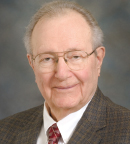
Emil J Freireich, MD, FASCO
Dr. Freireich died on February 1, 2021, at The University of Texas MD Anderson Cancer Center in Houston, where he had worked for 50 years. He was 93.
During a career that spanned more than 6 decades, Dr. Freireich was relentless in pursuing cures for childhood leukemia as well as other cancers. Along with his longtime colleague and friend Emil Frei III, MD, Dr. Freireich is credited with developing multiagent combination chemotherapy to treat acute lymphoblastic leukemia (ALL), which has led to 5-year survival rates of more than 90% in children with ALL, and more effective combination therapies for various adult cancers, including Hodgkin lymphoma. His subsequent discovery of allogeneic platelet transfusion to prevent nonstop bleeding in patients with acute leukemia transformed oncology care for patients.
“From that day forward, bleeding as a cause of death was essentially eliminated, and I consider that finding my greatest contribution to medicine, because we wouldn’t be able to treat patients with cancer today unless we had allogeneic platelet transfusions to prevent hemorrhage,” Dr. Freireich told The ASCO Post. Dr. Freireich later developed the first continuous-flow blood cell separator, which collects peripheral blood stem cells for transplantation and is still used today in most apheresis centers. In addition to his landmark research and clinical work in leukemia, he is renowned for his contributions to medical education. He also served as ASCO President from 1980 to 1981 and was named a Fellow of ASCO (FASCO) in 2007.
Dr. Freireich earned his bachelor’s degree from the University of Illinois in Champaign and the University of Illinois College of Medicine at Chicago. After an internship and residency in internal medicine at two Chicago hospitals, he accepted a fellowship in hematology at Massachusetts Memorial Hospital in Boston and subsequently made a discovery in anemia that led to the understanding of hemoglobin metabolism.
In 1955, Dr. Freireich was hired at the fledgling National Institutes of Health (NIH), where he was assigned to care for children in the leukemia ward. He, along with Dr. Frei; Gordon Zubrod, MD, then Clinical Director of the National Cancer Institute; and James Holland, MD, devised clinical trial Protocols 1 and 2 in ALL. The experience altered the course of childhood leukemia for millions of children.
In 1965, Dr. Freireich followed Dr. Frei to MD Anderson Cancer Center—now The University of Texas MD Anderson Cancer Center—in Houston. There they established a chemotherapy program and launched the Department of Developmental Therapeutics, which has been instrumental in training the best minds in oncology. Dr. Freireich became Director of MD Anderson’s Adult Leukemia Research Program in 1985. For many years, he held the cancer center’s Ruth Harriet Ainsworth Chair in Developmental Therapeutics and several faculty positions. He retired from the cancer center in 2015 but remained involved in the center’s medical education program and its institutional grand rounds.
Dr. Freireich is survived by his wife, Haroldine, and his children, Debra Ann Freireich-Bier (Ralph Bier); David Alan Freireich (Susan Morgan); Lindsay Gail Freireich; and Thomas Jon Freireich (Kelly Freireich); his grandchildren, Emily, Ellen, Chris, T.J., Sam, and Macy; and his great-grandchildren, Wyatt, Lyla, and Myles.
Sanjiv Sam Gambhir, MD, PhD

Sanjiv Sam Gambhir, MD, PhD
Dr. Gambhir, Professor and Chair of Radiology at the Stanford School of Medicine and an internationally recognized pioneer in molecular imaging, died on July 18, 2020, of cancer. He was 57.
The Virginia and D.K. Ludwig Professor of Cancer Research, Dr. Gambhir dedicated his career to developing methods of early disease detection, ushering in a new era of molecular imaging to flag signals of disease in its nascent stages. He was Director of the Canary Center at Stanford for Cancer Early Detection, Director of the Precision Health and Integrated Diagnostics Center at Stanford, and Director of the Molecular Imaging Program at Stanford.
Within the field of radiology, Dr. Gambhir was known for the development of positron-emission tomography (PET) reporter genes. On the eve of his death, he was awarded the Dean’s Medal, the Stanford University School of Medicine’s highest honor, for his “revolutionary contributions to biomedicine and to human health.” In tandem with the honor, a new professorship, the Sanjiv Sam Gambhir Professorship in Translational Medicine, was announced.
Dr. Gambhir’s efforts focused on bringing his unusual background—a physicist-mathematician turned physician-scientist—to bear on improving patient health by developing technologies that could reveal early signs of disease, especially cancer. Of his many research efforts, the creation of PET reporter gene expression imaging was among the most impactful, earning him a reputation as a founding father of molecular imaging.
In 2017, Dr. Gambhir determined that with recent advancements in biology and technology, he could formalize his approach more broadly. He helped to launch the Precision Health and Integrated Diagnostics Center at Stanford, a program that harnesses cross-disciplinary collaboration to prevent or stop disease early, ideally before it can substantially harm one’s health.
Dr. Gambhir was born in India, moved to Arizona with his family in 1969, and attended Arizona State University, graduating in 1983. With a bachelor’s degree in physics, Dr. Gambhir was accepted to the medical scientist training program at UCLA, where he completed a PhD program in biomathematics and also earned a medical degree.
By 2001, Dr. Gambhir was leading the Crump Institute at UCLA and was serving as Vice Chair of the Department of Molecular and Medical Pharmacology. Two years later, he accepted a position at the Stanford School of Medicine as Head of the Nuclear Medicine Division. Over his 17 years at Stanford University, Dr. Gambhir chaired the Department of Radiology, established and directed the Precision Health and Integrated Diagnostics Center, directed the Molecular Imaging Program at Stanford, and directed the Canary Center at Stanford for Cancer Early Detection.
Dr. Gambhir’s intense scrutiny of the molecular traces of disease and his efforts to design and iterate on detection technology always came back to one thing: his desire to make a tangible impact on patients.
“He would often start lab meetings by saying, ‘I want you all to remember why we’re here, and if anyone has forgotten, I want you to let me know and come over to the clinic with me, because…there are real people on the other side of this who we’re trying to help,’” recalled Michelle James, PhD, Assistant Professor of Radiology and one of Dr. Gambhir’s former lab members.
Adapted from an original obituary written by Hanae Armitage, a science writer in the Office of Communications at Stanford University.
Cornelius O. ‘Skip’ Granai, MD

Cornelius O. ‘Skip’ Granai, MD
Dr. Granai, Founder of the Program in Women’s Oncology at Women & Infants Hospital of Rhode Island, died on June 28, 2020, after a long bout with cancer.
Dr. Granai strongly believed that cancer care for women should encompass both breast and gynecologic cancers, according to his colleagues, who noted the concept was unique when he first espoused the idea at Women & Infant’s Hospital but ultimately proved to be a model for many other institutions.
Over the course of his professional life, Dr. Granai was on the faculties of Tufts, Harvard, and Brown Universities and on the staff of the New England Medical Center and Massachusetts General Hospital, ultimately joining Women & Infants Hospital in Providence, Rhode Island, where he served for more than 30 years. Dr. Granai became Director of Women’s Oncology and Executive Chief of Oncology for Care New England. That innovative, patient-centered program emphasized the importance of the arts and the heart in equal parts with medical knowledge in the practice of medicine.
Dr. Granai graduated from the University of Vermont in the class of 1970. He had joined Army ROTC while in college and served in the Army before going back to school. He went on to earn a master’s degree in cell biology from the University of Vermont and received his medical degree from the University of Vermont’s College of Medicine in 1977. He served a residency in obstetrics and gynecology at Tufts University School of Medicine and completed a fellowship in gynecologic oncology at New England Medical Center in Boston.
Dr. Granai is survived by Ann Kirby, his loving partner; his four children, Lieutenant Colonel Cornelius O. (Tad) Granai IV (wife Lindsey, children Hannah and Lilah); Robert Granai (wife Audra, children Ava, Tyler, and Ella); and their mother Mary Manzi; Lily Granai and Kile Granai, and their mother Cheryl Granai; his sisters Susan Granai (husband David Van Slyke) and Mary Corrigan (husband Ed); beloved nieces and nephews, caring aunts, and cousins; his faithful dog, Jenna; and an extended family in which he would include his many colleagues.
This obituary was adapted from a tribute written by Dr. Granai’s colleagues at Women & Infants and published online at the Society of Gynecologic Oncology.
Roger H. Herzig, MD
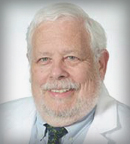
Roger H. Herzig, MD
Transplant doctors are a special breed, as was Dr. Herzig, who spent nearly 50 years of medical practice touching countless lives of patients with hematologic cancers, educating several generations of physicians, and helping establish bone marrow transplant programs internationally. Dr. Herzig died on July 18, 2020, at the age of 74.
Dr. Herzig received his undergraduate degree from the University of Cincinnati, after which he applied to medical school at Case Western Reserve University, Cleveland. During the Vietnam War, the brightest young physicians inducted into the military under the Doctors Draft had the option to go the NIH in an Associate Training Program. Dr. Herzig was vetted to the Oncology Branch of the National Cancer Institute (NCI), not the National Institute of Child Health and Human Development. There, he worked with early leukemia and hematopoietic cell transplant innovators, where he helped design therapies to treat people with leukemias and lymphomas.
After his service at the NIH, Dr. Herzig returned to Cleveland and became the founding Director of Bone Marrow Transplant Programs at University Hospital and the Cleveland Clinic, before moving to Louisville to serve as Director of the University of Louisville James Graham Brown Cancer Center in 1988. He contributed to research, education, and patient care through tenures at the University of Cincinnati and the University of Kentucky before returning to the University of Louisville in 2020.
Over the course of his distinguished career, Dr. Herzig formed close collaborations for clinical trials with members of the North American Marrow Transplant Group. Several of their outstanding contributions were studies of high-dose cytarabine for acute leukemia in relapse and later for consolidation, bone marrow autologous transplants for advanced lymphomas, and high-dose melphalan in hematopoietic cell transplants—therapies still in wide use today.
Dr. Herzig is survived by his spouse of 53 years, Donna Stern Herzig; his four children, David, Daniel, Robert, and Brian; three daughters-in-law, Belinda, Sallie, and Emilie; and nine grandchildren.
Beth Levine, MD

Beth Levine, MD
Dr. Levine, Professor of Internal Medicine and Microbiology, Director of the Center for Autophagy Research, and Charles Cameron Sprague Distinguished Chair in Biomedical Sciences at The University of Texas Southwestern Medical Center (UT Southwestern), and an investigator at the Howard Hughes Medical Institute, died on June 15, 2020, after a long battle with cancer. Dr. Levine is recognized as a leader in the field of autophagy research. She was 60.
After obtaining a degree in French studies from Brown University in 1981, Dr. Levine went on to earn her medical degree from Weill Cornell in 1986 and served as a resident at Mount Sinai New York City Hospital in internal medicine until 1989.
In 1989, she joined the lab of Dr. Diane Griffin at Johns Hopkins University in a postdoctoral position, working on infectious diseases and the neurobiology of viral pathogens. In 1992, she joined Columbia University, and from 1994 to 2004, Dr Levine served as the institution’s Director of Virology Research. In 2004, she moved to UT Southwestern to become Chief of the Division of Infectious Diseases, and in 2011, she was appointed Director of the Center for Autophagy Research. Dr. Levine also served as an investigator at Howard Hughes Medical Institute, beginning in 2008.
Dr. Levine specialized in the field of autophagy, more specifically, in its regulation and its role in diverse diseases, including cancer and infectious diseases. Her major contributions include the discovery of the mammalian autophagy gene, beclin 1, now the most-studied mammalian autophagy protein, and its role in tumor suppression, longevity, and antimicrobial host defense.
From a statement issued by UT Southwestern: “Dr. Levine will be remembered by colleagues as an elegant, driven, and focused researcher who demanded the best from herself and the more than 50 graduate students and postdoctoral researchers she mentored. Because of her efforts, autophagy moved from being a phenomenon observed in yeast to becoming recognized as an important mechanism of maintaining human health.”
Dr. Levine is survived by her husband, Milton Packer, MD, a cardiologist and former Professor and Chair of the Department of Clinical Sciences at UT Southwestern, and her two children, Rachel and Ben.
Joan H. (Rosen) Marks

Joan H. (Rosen) Marks
Ms. Marks, a pioneer in genetic counseling, died on September 14, 2020. She was 91. Ms. Marks received an honorary Doctor of Science degree from Sarah Lawrence College in Bronxville, New York, in 2019, in recognition of her contributions and leadership to the College and to society. She served at Sarah Lawrence for more than 26 years and is the namesake for the program she built—the Joan H. Marks Graduate Program in Human Genetics.
Ms. Marks received her bachelor’s degree from Sarah Lawrence College in 1951 and went on to earn a master’s degree in social work from Simmons College in Boston. She then embarked on a career as a psychiatric social worker at several major New York hospitals.
In 1972, Ms. Marks took the helm of what, at the time, was a 3-year-old genetic counseling graduate program at Sarah Lawrence—the first in the nation. During her decades-long tenure, she would grow the program to the largest in the nation and blaze the trail for an entirely new field in health care, blending the tenets of psychology, advocacy, biology, and medicine.
Joan’s husband of 67 years, Paul Marks, MD, who led the Memorial Sloan Kettering Cancer Center, died in May 2020. She is survived by two sons, Andrew and Matthew; a daughter, Elizabeth; six grandchildren; and two great-grandchildren.
Gordon McVie, BSc (Hons), MBChB, MD, FRCP, FRCPEd, FRCPS (Glas), FMedSci, DSc
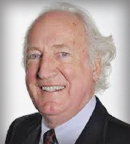
Gordon McVie, BSc (Hons), MBChB, MD, FRCP, FRCPEd, FRCPS (Glas), FMedSci, DSc
Professor McVie had a long career in academic research, followed in 1989 by becoming Director General of the United Kingdom’s Cancer Research Campaign. Under his leadership, 60 new anticancer drugs were taken from the laboratory into clinical trials. Professor McVie died on January 20, 2021. He was 76.
Professor McVie earned his degrees in science and medicine from The University of Edinburgh and became a lecturer in therapeutics and materia medica. From there, he became one of the United Kingdom’s young doctors to watch, garnering the admiration of nationally recognized Professor Gordon Hamilton Fairley at St. Bartholomew’s Hospital in London, then the only medical oncologist in the United Kingdom. Professor Fairley arranged for Professor McVie to visit the United States and rotate through multiple hospitals. However, just as Professor McVie’s path into oncology was beginning, Professor Fairley was killed in an IRA bombing. The tragic loss of his valued mentor and friend was so devastating, Professor McVie confided that it could have ended his career. Instead, “it inspired me to greater heights of achievement.”
A crucial need arose to set up an oncology system in West Scotland, an area with a population of 2.5 million. Professor McVie was the only Scot vigorously trained in medical oncology, so he was recruited. At 31, he became the first consultant in medical oncology in Scotland.
Professor McVie resolved to concentrate on new drug development, and to that end, he accepted a 3-month sabbatical at the Netherlands Cancer Institute in Amsterdam. It proved so stimulating to his research goals that he stayed there 9 years and became Clinical Research Director. He remained there until he was offered the position of Scientific Director at Cancer Research Campaign, back in London, and, in April 1996, of Director General.
On his profile on LinkedIn, he left his own legacy: “Forty years in cancer clinical research and people still dying in their thousands. I’d like a better epitaph than that so I’m still following my curiosity genotype, arranging marriages between lab and clinical scientists.”
Arthur W. Nienhuis, MD

Arthur W. Nienhuis, MD
Dr. Nienhuis, gene therapy pioneer and the fourth Director of St. Jude Children’s Research Hospital, died on February 3, 2021, at age 79. Under his leadership, the hospital grew exponentially in both size and scientific stature.
Dr. Nienhuis arrived at St. Jude in 1993, after posts as Chief of Clinical Hematology and Deputy Clinical Director at the NIH’s Heart, Lung, and Blood Institute. During his tenure, St. Jude built the Children’s Good Manufacturing Practice (GMP) facility; the Hartwell Center; the Memphis Grizzlies House, now known as Tri Delta Place; the Integrated Research Center, which was later renamed the Donald P. Pinkel, MD, Research Tower; and acquired St. Joseph’s Hospital. Dr. Nienhuis oversaw the creation of the Departments of Developmental Neurobiology and Structural Biology. He also strengthened programs in experimental hematology, bone marrow transplantation, pediatric oncology, and infectious diseases by recruiting new department chairs and institutional leaders.
Dr. Nienhuis was a world leader in the fields of hematology and gene therapy, serving as President of the American Society of Hematology in 1994 and the American Society of Gene Therapy in 2008. When he arrived at St. Jude, he was convinced that gene therapy would one day transform the practice of medicine, allowing clinicians to treat diseases caused by single-gene defects.
He proceeded to recruit scientists; establish a program; and build a $34 million GMP facility, where St. Jude could manufacture gene therapy vectors, monoclonal antibodies, and vaccines. One project that emerged from that effort was research on X-linked severe combined immune deficiency, or SCID-X1. His work with the late Brian Sorrentino, MD, of St. Jude Experimental Hematology, resulted in a cure for that disease, which was published in The New England Journal of Medicine in 2019.
Another transformational project involved the development of gene transfer for the treatment of hemophilia. His work with Andrew Davidoff, MD, St. Jude Surgery Chair, led to a clinical trial that transformed life for men with a severe form of hemophilia B by providing a safe, reliable source of the blood clotting protein factor IX.
After stepping down in 2004 from his position at the helm of St. Jude, Dr. Nienhuis returned to the laboratory to continue his life-saving research. He attained emeritus faculty status in 2016.
Dr. Nienhuis is survived by his wife, Corinne Ridolphi Nienhuis; his children, Carol Johnson (Barry), Craig Nienhuis (Julie), Kevin Nienhuis (Janay), and Heather Gallagher (Peter); his stepchildren, Dr. Lee Nichols (Holly), Emily Davis (Frank), Franklin Adams (Liz), Meriwether Nichols (Wende), and Dr. Will Adams (Lindsay). He is also survived by siblings Marilyn (Nienhuis) Timmerman, Wilma (Nienhuis) Van Til, and Robert and Jan Nienhuis; as well as 10 grandchildren. He was predeceased by his wife Sheryl; his sister Dorothy; and stepson Cole Nichols.
Joseph V. Simone, MD
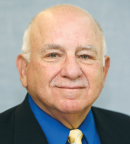
Joseph V. Simone, MD
When Dr. Simone was 6 years old, he had his first experience with the death of a child. His 9-month-old brother became sick with the croup and was taken to the nearby children’s hospital, where he died a few days later, leaving Dr. Simone and his family devastated. Caring for sick children facing their own mortality would later define much of Dr. Simone’s remarkable career. He headed the research that resulted in the first curative combination treatment for certain pediatric patients with acute lymphoblastic leukemia (ALL). Dr. Simone died on January 21, 2021. He was 85.
Dr. Simone earned a scholarship to Loyola University, where he pursued his medical degree at the University’s affiliate Stritch School of Medicine. Dr. Simone remained at Loyola for his internship, residency, and fellowship training, first in internal medicine and then in pediatrics, at Presbyterian St. Luke Hospital (now Rush) in Chicago.
After completing his fellowship at Loyola, Dr. Simone was offered a position at St. Jude Children’s Research Hospital in Memphis. According to Dr. Simone, he and his team initiated “some very good clinical trials; we were extremely systematic about it, and careful, and we just hit a homerun.” The homerun Dr. Simone referred to with inimitable modesty was the first curative combination treatment for select children with ALL, which led to the first patient to be successfully taken off therapy.
Dr. Simone would go on to spend 24 fruitful years at St. Jude. In 1983, under his leadership, the hospital was acknowledged as the first and only NCI-designated comprehensive cancer center dedicated entirely to children.
In 1992, Dr. Simone was invited to become Physician-in-Chief of Memorial Sloan-Kettering Cancer Center (MSK) in New York, an opportunity to begin thinking of oncology on a structural level. While at MSK, Dr. Simone began a career focused on quality improvement in cancer care. At the time, the Clinton administration’s health initiative was bent on reducing health-care costs, an admirable goal, but one which, in Dr. Simone’s insight, did not give enough consideration to the cost-value equation.
In response, Dr. Simone began collecting data on the quality of care, which he loosely dubbed, “the MSK Disease Management Program,” from which early practice guidelines were developed. Dr. Simone’s program became the precursor to ASCO’s Quality Oncology Practice Initiative (QOPI®). Moreover, he also saw the cost-saving trend of directing patients with cancer to less-expensive community hospitals instead of multidisciplinary cancer centers as being clinically pennywise but dollar foolish, given the better outcomes data at large centers of excellence.
Due to his national standing, Dr. Simone was asked to lead a subgroup to develop a plan around the idea of higher quality and, incidentally, to serve as the first head of the project. This project would become the National Comprehensive Cancer Network®, whose practice guidelines continue to serve the oncology community as the gold standard for delivering high-value care for patients with cancer.
Always seeking to better the field, after leaving MSK, Dr. Simone’s career path took him to the Huntsman Cancer Institute at the University of Utah. There, he served as the first Senior Clinical Director and then moved on to the Shands Cancer Center at the University of Florida.
Dr. Simone is the author of Simone’s Maxims, revered by the oncology community since its publication in 1999. One maxim states that “academic medicine is a noble profession.” Indeed, Dr. Simone would later say “I am grateful that fate and early training led me into academic medicine, and I would do it again in a New York minute.”
Neil Spector, MD
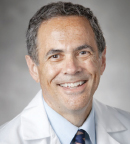
Neil Spector, MD
Dr. Spector, a physician-scientist, translational research leader, and oncology mentor died on June 14, 2020. He was 63. Dr. Spector was the Sandra Coates Associate Professor in the Department of Medicine, Associate Professor of Pharmacology and Cancer Biology, and a member of the Duke Cancer Institute.
Dr. Spector joined Duke Cancer Institute and the faculty at Duke University School of Medicine in September 2006, after serving for 8 years as Director of Exploratory Medical Sciences-Oncology at GlaxoSmithKline and as Adjunct Associate Professor of Medicine, Division of Hematology/Oncology, University of North Carolina at Chapel Hill. Dr. Spector’s appointments at the Duke Cancer Institute include having served as Associate Director for Translational Research, Director of the Developmental Therapeutics Program, and Associate Co-Director of Clinical Research with the breast cancer disease group.
His laboratory research focused on elucidating molecular mechanisms of therapeutic resistance to targeted therapies and strategies to prevent and overcome resistance. Dr. Spector is credited with leading two molecularly targeted therapies to approval by the U.S. Food and Drug Administration: one for the treatment of pediatric T-cell ALL (nelarabine) and another for the treatment of HER2-overexpressing breast cancers (lapatinib).
A medical oncologist, Dr. Spector most recently served as an attending physician and supervised medical oncology fellows at the Durham Veterans Administration Healthcare System. In July 2016, he was appointed Inaugural Director of the National Precision Oncology Program at the Veterans Health Administration, U.S. Department of Veterans Affairs, part of the Cancer Moonshot initiative launched that year.
Dr. Spector wrote Gone in a Heartbeat: A Physician’s Search for True Healing, which was published in 2015. The book chronicles his battle with Lyme disease, which went undiagnosed and untreated for years. Finally diagnosed in 1997, the disease ultimately damaged his heart, and in 2009, Dr. Spector received a heart transplant at Duke. He would go on to carry out his own research into Lyme and other tick-borne diseases, most recently investigating a possible overlap between some of these pathogens and cancer.
Dr. Spector earned his medical degree at the University of Medicine and Dentistry of New Jersey in 1982. He completed his medical oncology and hematology fellowship training at Massachusetts General Hospital and Dana-Farber Cancer Institute/Harvard Medical School, where he remained on faculty until 1993, seeing patients and conducting basic cancer research. From 1993 to 1998, he served on the faculty at the University of Miami School of Medicine, Division Hematology/Oncology.
Dr. Spector is survived by his wife, Denise, and daughter, Celeste.
This tribute was adapted from “Gone Too Soon: Dr. Neil Spector Passes Away,” written by Julie Poucher Harbin and published on the Duke Cancer Institute blog. The full version may be viewed at http://www.dukecancerinstitute.org/blog.
Tabaré Vázquez, MD
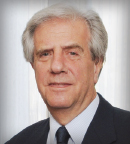
Tabaré Vázquez, MD
In 2006, President of Uruguay Dr. Vázquez, a radiation oncologist by profession, enacted comprehensive antismoking legislation, eventually leading Uruguay to become the first country in Latin America to prohibit smoking in enclosed public spaces. His bold action drew the ire of international tobacco giant Philip Morris International; after 6 years of grueling legal battles, which affected the future of multinational jurisprudence, the World Bank ruled in favor of Uruguay, giving President Vázquez a huge victory for his country’s public health. He would continue to champion smoking cessation measures throughout his presidency. Dr. Vázquez died of lung cancer on December 6, 2020. He was 80 years old.
The son of an oil worker, Dr. Vázquez grew up in a tin-roofed shack in the working-class La Teja neighborhood of Montevideo. Determined to pull himself out of poverty, he passed rigorous entrance exams and entered the Universidad de la República Medical School, a competitive 6-year period of lecture and clinical work. During this time, he decided to become an oncologist, motivated largely by the deaths of his sister, brother, and father, all of whom died of cancer.
Dr. Vázquez received his medical degree in oncology in 1972, entered into private practice, and quickly built a national reputation as a radiation oncologist. He also served as Director of the University of the Republic Medical School’s Department of Radiology.
Given his early experience with poverty and its effects on the human condition, Dr. Vázquez began to nurture political aspirations as another way, along with medicine, in which he could better the lives of his fellow citizens. Dr. Vázquez was elected to the presidency in 2004. The historic significance of the victory was far-reaching, as he was the nation’s first leftist president.
When Dr. Vázquez died in December 2020, President Luis Lacalle Pou declared 3 days of national mourning, noting in an address that “Uruguay lost a prominent scientist and a citizen defender of human rights.”
Flossie Wong-Staal, PhD

Flossie Wong-Staal, PhD
Dr. Wong-Staal, the first researcher to clone HIV and determine the function of its genes, died on July 8, 2020, at the age of 73.
Dr. Wong-Staal was born Yee Ching Wong in Guangzhou, China, to parents who, like many Chinese citizens of that generation in the late 1940s, fled to Hong Kong to escape the deprivations caused by the Communist Revolution. She left Hong Kong at the age of 18, to attend UCLA, where she earned a bachelor’s degree in bacteriology in just 3 years, graduating magna cum laude. Dr. Wong-Staal received her PhD in molecular biology in 1972 from UCLA, after which she did her postdoctoral work at the University of California, San Diego (UCSD), where her research efforts took root.
In 1973, Dr. Wong-Staal’s career took a sharp upward turn when she moved to Bethesda, Maryland, to work at the NCI, studying retroviruses with Robert Gallo, MD, who was a pioneer in HIV research. Dr. Wong-Staal and Dr. Gallo quickly united in both intellect and energy, as they searched for the cause of HIV, which had recently penetrated the U.S. population, stymying health-care experts across the nation. In 1983, the hard work paid off, and along with Luc Montagnier, PhD, in France, Dr. Wong-Staal and her NCI colleagues simultaneously discovered that HIV was the virus that caused AIDS.
In 1985, Dr. Wong-Staal became the first researcher to clone HIV, which led to the primary genetic map of the virus and the development of the first blood test for HIV. In 1990, she returned to the West Coast, joining the staff at UCSD, where she continued her research efforts at the newly opened Center for AIDS Research. Not long after, she became the Center’s Chair.
Several years later, Dr. Wong-Staal became Vice President and Chief Scientific Officer for Genomics at the startup company Immusol. A year into her tenure there, Dr. Wong-Staal saw the need for better drugs to treat hepatitis C, and she moved Immusol’s therapeutic focus into the hepatitis C market. It was during this bold restructuring that Discover magazine named Dr. Wong-Staal one of the world’s 50 most important women scientists.
Her colleagues and friends remember her as a woman who navigated a competitive, male-dominated research world with quiet confidence, always there to support and mentor young researchers, many of whom went on to distinguished careers.
In addition to her husband, she is survived by two daughters, a sister, two brothers, and four grandchildren.

